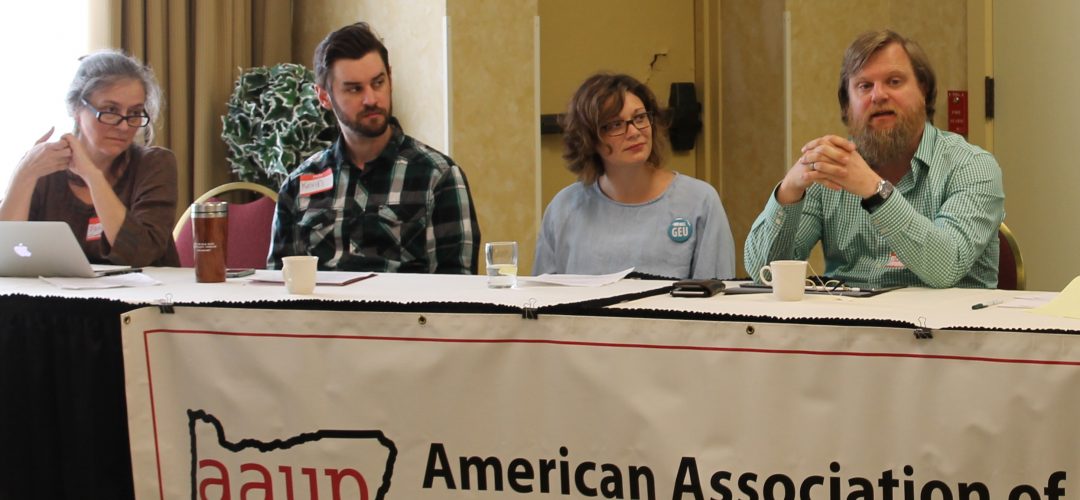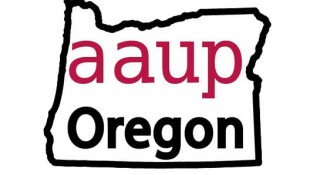Willamette AAUP: We are Stronger Together

 by Frann Michel, President, Willamette-AAUP
by Frann Michel, President, Willamette-AAUP
At Willamette University, faculty-student organizing brought the Board of Trustees to the negotiating table: we are stronger together.
Last summer, 2015, a small number of faculty (both T and NTT) of the College of Liberal Arts at Willamette University had a few meetings with organizers from AAUP-OR and formed an advocacy chapter (http://www.wuaaup.org/). Willamette University is a private institution, consisting of an undergraduate college (about 2000 students, 135 faculty) and graduate schools of Law and Management (about 650 students combined); the Master’s Program in Education closed in 2014, in a process criticized by the AAUP, but not fully investigated nor officially censured. Like many of our colleagues in both private and public higher education around the state and around the nation, we had been feeling increasing pressure to cut budgets, and we had been wondering about the new administrators appearing on our campus.
During the year, the chapter held socials, raised awareness on campus about the position of contingent faculty, and conducted a survey on governance (based on material available on the national AAUP website), among other activities. Survey results here
By the middle of our spring semester, the membership had more than tripled (though we were still a minority of faculty, all drawn from the CLA).
Meanwhile, faculty and students on campus were also organizing in response to a number of developments. The most significant of these from a faculty perspective was a resolution by the Board of Trustees linking CLA faculty numbers to enrollment figures, and fixing the faculty at a 10-to-1 ratio, with no more than 80 percent of faculty to be comprised of tenured, tenure-track, and continuing non-tenure-track positions. The most notable event for the campus and community as a whole, however, was the announcement of sharp reductions to and changes in the Willamette Academy, an affiliated academic enrichment program for underserved middle- and high-school students in the Salem area. In response to both of these events, faculty protested through established channels of governance or through individual statements, and in response to the latter, students held a series of visible public demonstrations. Late in the spring semester, the president of the student government resigned in protest of the changes to the Academy and related actions by the administration, publishing his letter of resignation in the student newspaper.
In response, the AAUP published a brief statement of support, and coordinated the crafting and circulating of a letter from concerned tenured faculty. Although this letter stopped short of explicitly endorsing the outgoing student body president’s call for the resignation of the CLA Dean and the University President, more than two-thirds of tenured faculty signed on, and it was published in the student newspaper along with articles focusing on many of the various grievances that had accumulated during the year. At a series of faculty discussions, we debated the possibility of a vote of no confidence in the President. During the same weeks, the Dean announced her earlier-than-anticipated retirement, and a number of revisions to the plans for Willamette Academy were announced. Elected Chairs of faculty governance committees contacted Trustees with news of the possibility that the faculty would be presenting a list of demands, with the promise of a vote of no confidence if they were not met by the end of 2016. In response, Trustees agreed to meet with faculty and student representatives to settle on a series of shared points of agreement regarding CLA governance.
In May, a group including representatives from the Board, from student government and student activists, from faculty committees, and from the AAUP met to agree on guiding principles and action items. Among the ten action items settled, all of the changes to Willamette Academy were reversed, and the Board agreed to revisit their resolution and consider other ways of holding costs to a responsible level.
Membership in the AAUP Advocacy chapter at Willamette is now five times the founding membership, and faculty members across the college are learning more about our rights and responsibilities. Faculty know that we will need to continue monitoring practices of shared governance, and we have also learned much about the value of organizing with students, staff, and colleagues.

